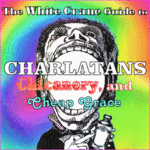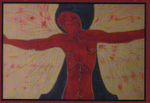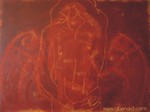| Performed by 21 deaf girls and boys from China’s Disabled Peoples | |
Easton Mountain Gathering Notes & Audio Clips
by Perry Brass
I was able to attend the Gay Spirit Gathering, held at Easton Mountain Retreat, in upstate New York, near Troy, from Sunday evening, October 29, until Wednesday afternoon, November 1.
The gathering was actually a “sequel” to the larger Gay Men’s Spirit Culture Summit held in Garrison, NY, two years earlier; but this gathering was smaller, with about 35 participants, and wonderfully intimate and moving. I took brief notes of some of the comments and quotes given during activities which often consisted simply of men talking about their involvement with spirituality, their communities, and other people like themselves. Some of these have speaker attributes, others do not.
“Gay does not have a monopoly on joy, but has a real nifty corner of it.” Tim Cooley, Easton Mountain
“The longing is the path. Heart connection is a concrete force we use. We’re all longing for something. There is a power in longing, compassion, and peace. Assertive is not being violent. I want to emulate the ferocity of flowers.” Joe Weston, California
“Have I given people a sense of their soul?” Harry Hay, just before his death, quoted by Dan Vera, Washington, DC
“The necessary beauty of their lives—our gift is to remind people of that.” Dan Vera
“I spend a lot of time in the world of shadows, that dark place of fear and power.” Rosey, New York
“I don’t believe in self-help. I believe in inhabiting the masks completely.” Rosey, New York
“Passion comes from holding my outrage and idealism together.” John Stasio, Easton Mountain
“Surrender to the truth of your own experiences . . . what drives me is the choicelessness of my life.” John Stasio
“I seek the company of my fellows because I know how dangerous the world we live in is.” John Stasio
“My passion comes from the strength to keep my innocence alive, and to honor that innocence in others.” Perry Brass, Bronx, NY
“My passion comes from knowing God loves me . . . Lead a full life, claim your spiritual heritage.” Michael Kelly, Easton Mountain, via Australia
"We all stand beside our own pool of tears.”
“This thing called the body, and using it to connect with desire makes me passionate.”
“Words—I’m passionate about things being said well. I act through the body. I’m passionate about healing through pleasure . . . To be alive in your body is to be awake in the world.” Don Shewey, New York, NY
“I had long-term short relationships. But I did not know what love was; I was not big enough to know the fullness of love.”
Thoughts of my own:
Structure is a point of entry into each other.
The problem of people who become conduits for the Eternal is that they become aware at some point of their own emptiness.
Statements from a panel on the future
of Gay Spirituality and the movement toward it:
Audio Links to each panelist’s talk are below each summation and will open in a separate window. Audio is in mp3 format and will take a few seconds to download.
 Toby Johnson (writer and therapist):
Toby Johnson (writer and therapist):
“We are part of the ‘new myth,’ a shift in consciousness. Gay consciousness sees the world from outside and above, since we don’t fit in. Homosexuality is a dynamic of psychology rather than of biology; a function of consciousness. The Gay Movement is in two forms: political and society; and gay spirituality, addressing ourselves directly.
“Let’s change each other.
“Homosexuality should be a spiritual gift. It is a dynamic of consciousness, and makes use of kindness and spirituality. We need to change our vision of homosexuality. Wake up the boddhisatvas!”
Toby Johnson’s Statement (mp3 audio) (first few words are missing, apologies)

Michael Cohen (therapist and Body Electric facilitator):
“I see lots of hungry men wanting information and permission to be in a body. Initiation is important; Body Electric is about initiation. The secret mission of Body Electric is to ‘crack open your heart,’ to make men fall in love with themselves again.”
Michael Cohen’s Full Statement (mp3 audio)
 Jay Michaelson (teacher and writer):
Jay Michaelson (teacher and writer):
“Gay spirituality is powerful, transformative, and limited. I am not interested in the ‘origins of homosexuality,’ the debate in pop culture. We need to bring our work out into the world.
“Are we the alternative to Western religion, or are we trying to make Western religion more open to us?
“Marketing is important to understand in the growing of the movement.”
Jay Michaelson’s Full Statement (mp3 audio)
 Duncan Teague
Duncan Teague
(performance poet and Afro-American spiritual leader):
“I want to acknowlege the ‘Lord,’ or the people who’ve made Easton possible. People are still struggling with spirituality, liberation, and consciousness. Church is home for Afro-Americans. We want to recreate a church where we can feel spiritual.
How many black gays have done Body Electric?
I’m a Unitarian because they support what I do.
“It’s about our relationships, and that white gay men exist in their own planet.
Katrina shifted the consciousness of this country. If Katrina had happened in Connecticut, wouldn’t things have been different?”
Duncan Teague’s Full Statement (mp3 audio)
 John Stasio (founder and director of Easton Mountain Retreat):
John Stasio (founder and director of Easton Mountain Retreat):
“I live in a rarified environment.
Each one of us has a dimension in our experience connected to a larger experience or community. The work of this movement is help us navigate in that inner world. I had an experience as a boy of being connected to the galaxy. It made religious rules have no reality. I had that religious experience at 17. At 19, in bed with man I was infatuated with, I had a vision of Jesus coming down from a picture in my room and entering a threesome with us. So helping people have a profound experience about themselves is what my work is all about. It is irresponsible of us to look at people who can’t help us—such as organized religion—instead of ourselves. The epidemic made us ask big questions about the meaning of life. Death is a profound teacher. We need to have rich, meaningful lives together. If we can support that, we can have a community together.
John Stasio’s Full Statement (mp3 audio)
More remarks:
“We need to be a source of action in the world.” Rosey
“In terms of historical moments, we, the community, haven’t had that much time. We have the resources to go further.” Chris Bartlett, Philadelphia, PA
“Not being ashamed is work, and transformative.”
“We’re winning; things cannot go back.” Toby Johnson
“Everyday something happens that tells me I am an oppressed person.” Harry Faddis, Easton Mountain
“There are people who need to receive the invitation to open spaces.” Dan Vera
“This is a fruit of grace that we can meet and be here.” Michael Kelly
“Ask yourself: What is the next right thing to do?" David Coleman
And the charlatans continue…
The focus of my re:Sources guide for this latest issue of White Crane was on religious hypocrisy. We don’t have to look very far to see that it’s still going on, because it’s been all over the news of late.
Last week Ted Haggard, president of the National Association of Evangelicals and leader of the Colorado based New Life Church, was called out on his relationship with another man. Haggard has been a vocal supporter of Colorado’s anti-gay marriage amendment, which goes to a statewide vote tomorrow, November 7th.
There are so many layers to this story, not just Haggard’s adultery with a 49 year old male escort, but also what seems to be a possible crystal meth habit as well. I see this whole package as an prime example of the soul-crushing power of religiously based homophobia.
This one man rose to power holding this secret, and using his own internal pain directed his anger back against the gay community. In his own attempts to understand himself he turned to illicit relationships for cash, he fell into one of the most dangerously addictive drugs available (and one that is running rampant through the gay community), and he just kept on lying about it. Denying who he was led to this amazing fall from grace.
And let’s be honest, this is a big problem for the evangelical movement. Their constant repression of homosexuals leads to exactly this kind of situation; someone in the closet who rises to a position of power only to be outed and fall. The sadder thing is that Ted Haggard is just one of the most visible victims of evangelical homophobia. There are many other people, children and adults, who are twisted up inside because of this hate.
I know. I was one of them once.
I was lucky in that my family allowed me to come and go from religious beliefs as I saw fit. But I wanted to believe that I could be "good." And I tried, and I suffered because of it. I left when I decided that any God who made me this way and also wanted me to suffer because of it was no God I wanted to have in my life.
Maybe it’s Stockholm Syndrome or masochism, but I don’t understand why people would want to be subjected to that kind of emotional and psychological torture. Maybe it’s lust for power, or a desire for personal control. Maybe they just don’t know any better. Whatever the reason, the effects are obvious; lying, denying, self-loathing, and abusive and addictive behavior.
What will happen to Ted Haggard? This must be an extremely difficult time for him. What will he do with his life now that he’s no longer in his position of power? Will he look at himself for the person he is, and re-evaluate his relationship with God? He’s got a lot of explaining to do, and he’s got to start with himself.
John Burnside’s Experimental Film
Gay Elder, writer, inventor and one of the founders of the Radical Faerie development John Burnside has a lovely little film of his poem "Learning, Yearning, Burning" up at You Tube. In it he recites his poem as photographs of his life with Harry Hay come on the screen.
It is a lovely poem and a lovely little film. Check it out here.
New Issue
 Just in case you’ve arrived at this page first…the new issue of White Crane, The White Crane Guide to Charlatans, Chicanery and Other Perils of Cheap Grace in Gay Spirit Land, with articles by Perry Brass, Malcolm Boyd, Chris Bartlett and others, is in the mail and up on the web.
Just in case you’ve arrived at this page first…the new issue of White Crane, The White Crane Guide to Charlatans, Chicanery and Other Perils of Cheap Grace in Gay Spirit Land, with articles by Perry Brass, Malcolm Boyd, Chris Bartlett and others, is in the mail and up on the web.
An Artist of Note – Gonzalo Benard
Received word this morning that Gonzalo Benard, a young Spanish artist who graciously gave us permission to use his beautiful Wings of Pleasure on the cover of White Cr ane’s edition of Mark Thompson’s Gay Spirit: Myth & Meaning has been nominated for the Premio Luso Espanol de Arte Y Cultura (The Spanish Luso Prize for Art & Culture.) The prize includes a cash award of 75,000 Euros and is presented by the Ministries of Culture of both Spain and Portugal as a way of strengthening artistic and cultural relations between the two countries.
ane’s edition of Mark Thompson’s Gay Spirit: Myth & Meaning has been nominated for the Premio Luso Espanol de Arte Y Cultura (The Spanish Luso Prize for Art & Culture.) The prize includes a cash award of 75,000 Euros and is presented by the Ministries of Culture of both Spain and Portugal as a way of strengthening artistic and cultural relations between the two countries.
 This is one of Benard’s recent works pictured here, entitled On Fire.
This is one of Benard’s recent works pictured here, entitled On Fire.
Benard lives in Barcelona and works in acrylics and other media.
Buena Suerte Gonza!
White Crane #70 – Contents

The White Crane Guide
to Charlatans, Chicanery & Other Perils of Cheap Grace in Gay Spirit Land
Cover Art by Frederick Nunley
FALL 2006 · # 70
ONLINE SAMPLES ARE HIGHLIGHTED AS LINKS
Departments
Opening Words
"If You Meet the Buddha In the Baths"
by Dan Vera & Bo Young
Call for Submissions
Letters
Updrafts by Dan Vera
Honoring Elders "John Addington Symonds" by Dan Vera (PDF file)
re:Sources by Eric Riley
The Everyday Sacred by Donald Engstrom
PRAXIS “Air Freshener for the Soul” by Andrew Ramer
Subscriber Information
Specials
A White Crane Interview with Peter Grahame of Ironic Horse Studios
Bo Young & Dan Vera
My People, My Tribe:
An Interview with C. Cleo Creech
Dan Vera
Taking Issue:
The White Crane Guide to Charlatans, Chicanery
& Other Perils of Cheap Grace in Gay Spirit Land:
All Our Lies Holy by Randy P. Conner
Superchrist in a Superstate by Malcolm Boyd
The Everyday Charlatan by Greg Marzullo
Prophets For Profits: Dodging False Messiahs by Perry Brass
Your Money or Your Life by Q. Planet
Keep It Quiet: Secret Mentorship for New Generations Of Queer Men And Women by Chris Bartlett
Poetry
June 22, 1969-June 27, 1969 by C. Cleo Creech
Pentecost by James Day
Culture & Books
Kathleen Dobie on
Now Is the Hour by Tom Spanbauer
Jesse Monteagudo on
Two Spirits: A Story of Life With the Navajo by Walter L. Williams & Toby Johnson
Amara Das Wilhelm on
Love’s Rite: Same-Sex Marriage in India and the West by Ruth Vanita
Greg Fletcher-Marzullo on
Vellum: The Book of All Hours by Hal Duncan
Jesse Monteagudo on
Behind the Mask of the Mattachine: The Hal Call Chronicles and the Early Movement for Homosexual Emancipation by James T. Sears
Toby Johnson on
Sex and the Sacred: Gay Identity and Spiritual Growth by Daniel Helminiak
Steven LaVigne on
Two Boys in Love by Lawrence Schimel
Steven LaVigne on
The Passion of Mary Magdalen by Elizabeth Cunningham
Toby Johnson on
Blessing Same-Sex Unions: The Perils of Queer Romance and the Confusions of Christian Marriage by Mark Jordan
MUSIC:
Bo Young on
Buddha Machine by FM3
WC70 – Opening Words – Editors
Opening Words from the Editors
If you meet the Buddha in the Baths…
Dan Vera & Bo Young
Dan Vera: A few months back we heard from a writer we’d published. A somewhat well-known writer who had a change of heart — to be charitable — and no longer wanted to be known as a gay man. Although he was duplicitous in his dealings with us, taking us around the block with many tales of woe and stalkers, before he came clean and admitted the truth. The real reasons he wanted his material removed from our website was it was going to hurt his sales in Asia if he were known as a gay writer. Now this guy was looked up to as a source of “wisdom” by his readers and a “guide” for living the right life. Behind the scenes he’d made the decision that it wasn’t lucrative to his career to be known as a gay man.
Bo Young: When we asked around we heard from other people that this sort of thing has happened for years in magazine publishing. The whole point of White Crane has been that the talking circle eliminates the need for leaders. If we share our stories, we can learn from the collective wisdom of the community. As Sheldon Kopp famously advised, “If you meet the Buddha on the road, kill him.” I think I have just reached a point where I don’t buy into the whole “guru” thing anymore.
Dan: For some reason I’m thinking of “right livelihood” which is good and what we’re talking about here… how would we differentiate?
Bo: That’s a good question…because there are some people that I’m fine with and others that my bullshit detectors just go off. It’s a difficult distinction, and it gets back to the idea of discernment, which is, in one way or another, the topic we’ve been dancing around for the last four or five issues…just calling it another name, or approaching it from a different angle…like calling it “healthy spirituality.”
Dan: There are always exceptions to the rule. Last issue we spent some time discussing the need for mentors, or guides for the path. This issue, in a way, seems like a guide for what to watch out for. What sets off bullshit detectors? I mean on the one hand people got to put food on the table. We don’t have institutions that would normally take care of people doing this kind of work.
Bo: Well we do have institutions, but some of them are also simply imitations of old style, hierarchal institutions…it’s just “daddy telling you what to do” all over again…
Dan: So, maybe what we’re not crazy about is another “priestly class” of gurus?
Bo: But there seems to be this gaggle of people who see the whole “gay spirituality” movement as a career opportunity and present themselves as having all the answers, when I sincerely doubt they’re even asking the right questions. All they’ve really done is read the “canon” as it were, then they repackage it with themselves at the center, and hope to book a few author’s tours and cruises. It always comes back to Bob Barzan’s genius for me. He always used to say he thought most people had a good pamphlet in them, but the publishing business forced people to produce whole books…stretching a subject beyond it’s need and the thing writer had to say. If I get one more book that promises me “Self-Transformation for Joyful Living” I’m going to use them for fire starters!
Dan: Yeah, but combustion is never a good idea with those types of books. Because they always come clad with a glossy cover emblazoned with a soft-core smiling models. I can imagine the toxic fumes those glossy covers would give off in a fireplace. But your mentioning of cruises and retreats brings up the disturbing issues of class that are likely to come up around that kind of programming. It enforces an idea that only the wealthy or connected can have access to wisdom – that you need a spa to transcend.
Bo: Or the “nobility” of poverty. Somewhere in that scale is “the noble Indian” too, for lack of a better term. Or all things Indian are, by definition, holier, Earthier, more spiritual.
Dan: Yes. It’s faddish almost. A good teacher of mine, I don’t want to name drop here, used to joke that in Indian communities they always qualified Indian time in terms of “B.C.” eras. “Before Columbus,” “Before Custer” or “Before Costner.” Many Indian scholars see new age interest in Indian Religions as a form of self-colonization on the part of Indian tribes in which their rituals become a spectacle or observed event, completely changing the communal power.
Bo: And again…we come full circle to discernment…how do we know when to say “enough”? The thing that keeps coming to me is our “Be Your Own Guru” t-shirt. “Snake oil” and “charlatan” comes down discernment…how to separate wheat from chaff, gold from fools gold? — or fools from their gold?
Dan: There’s a lot of pyrite in them thar hills. That brings up another bullshit warning. Beware a teacher who claims infallibility. I love that old line from the Kena Upanishad: “If you believe you know, you do not know. If you believe you do not know, you know.” It doesn’t mean there aren’t basic understandings, but absolutes are very tricky.
Bo: Sure…and there’s another dynamic of seeing something or someone who once was a teacher for you but is no longer…someone is still going to need that kind of teaching even if YOU don’t. “Been there, done that” doesn’t necessarily mean it no longer has value.
Dan: Agreed. It once held value but doesn’t anymore. But there are some who never break from that. They never seem to move beyond that disciple stage or even know it’s a possibility.
Bo: There are people who never leave therapy, either…and there’s a connection. In therapy there’s the phenomenon called transference and reverse transference (from the therapist to the patient). It’s no accident that some of our most loyal readers are therapists. Doing your own psychological work is an inherent part of spiritual growth. So there’s a natural bent towards “self-help” work and therapists and “those from whom all wisdom flows” and I guess my own interest is where does that process end and when do we stand up and say “you know, I think I have the tools I need to make my own mind up”…that’s discernment. When do we start looking inside ourselves for the answers instead of outside? I’m tired of being told that the answers are “out there” and that we need some intermediary to attain it…one of the first things I ever wrote was my own declaration of what I was seeking and right at the top of the list was I was tired (as a recovering Roman Catholic) of intermediaries interpreting for me. I was willing to sit in student/teacher relationship, but only if I knew there was going to be an end to it and at some point knowledge and such would be passed along to me.
Dan: I think another thing to always watch for is our own penchant for placing teachers on pedestals. We forget their fallibility. And it’s not useful. We don’t need more hierarchies. We’re not maturing. We’re giving the authority, again, to someone else.
Bo: When I was trained as a therapist, one teacher suggested that therapy was like a boat that people take to get “the other shore.” But the problem was, most people never got out of the boat! And it’s the same with spiritual gurus and teachers. People either get lost in the myth or the myth-teller, it seems, and forget that it’s meant to be poetry and metaphor trying to explain something that is, in the end, unexplainable. It’s Dorothy and the Wizard. Eventually someone has to pull the curtain and see who’s pulling the strings. Learning that those imperfections — including my own — were part of the deal. That’s something I think people fall prey to…this idea that we can BE perfected.
Dan: When you say people fall prey, do you mean searchers or leaders? Or both? I’m guessing searchers because that’s the belief that can be preyed upon by a bad guru. A “buru.” I think it’s the role of the mentor to be constantly checking his altitude. When you sense you’re floating too high, you need to step off the pedestal you’re being placed on. “Uh oh, the air is thinning. Crap. They’re doing it again.” [teacher steps down]
Bo: And I still think that’s putting the responsibility on the outside. At some point each of us has to know when to say “enough.” When to know when the learning has run its course and now it’s time to move on. Which is not to say we don’t value teaching. I just have reached a point where I think the ultimate authority has to be YOU.
Dan: There’s that great story in the Christian Gospels about Jesus washing his disciples’ feet, which is enormously revolutionary.
Bo: Yes. That’s certainly a Christian image that sticks with me. The humility. You don’t see a whole hell of a lot of humility out there. It’s usually “I have all the answers.” Or I have the answers you need, at least…follow me.
Dan: Another warning sign is beware a guru who’s an angel in public and a mean S.O.B. in private. I’m sure we could tell stories. For me it means that one’s public and private life shouldn’t be a Jekyll and Hyde production.
Bo: And doesn’t that seem like it should go without saying almost?
Dan: Sure, but then you run into so many “private bastard/public angel” that you think that’s normal.
Bo: That’s why I love the idea of the “secret mentor” that Chris Bartlett writes about in this issue. The Jewish tradition has levels of mitzvahs where you do good deeds, with varying levels of public knowledge or awareness about it…ranging from everyone knowing you’ve done it to it being done in complete anonymity. Eric Rofes would talk about this…being a “secret mentor”…he would see someone who he believed was doing good work or had potential to do good work and he would support them. But he would do it without letting them know he was doing it…sending books, articles, making connections for them.
Dan: Look, I think what we’re talking about is another refraction of the last issue, which was all about mentors and maturity and transmitting gay culture. We’re all searching out and trying to make sense of this “one wild and precious life” as Mary Oliver puts it. We find guides, fellow travelers, who can point us in the right direction. Some of them screw us over and some of them honor us with their grace.
Bo: Occasionally, the screwing over is as valuable as the grace. The “screwing over” is the grace.
Dan: Well, yeah. So, we do our own work knowing that we’re going to be called on to guide others after us. So this issue is as much a handbook for future guides as it is a warning to searchers.
This is just an excerpt from this issue of White Crane. We are reader-supported and need you to subscribe to keep this conversation going. So to read more from this wonderful issue SUBSCRIBE to White Crane. Thanks!
White Crane #70 – Poem by C. Cleo Creech
June 22, 1969-June 27, 1969
by C. Cleo Creech

A partial Filmography:
1937, Broadway Melody of 1938
1939, The Wizard of Oz
1940, Strike Up the Band
1941, Ziegfield Girl
1944, Meet Me in St. Louis
1946, Ziegfield Follies of 1946
1948, Easter Parade
1950, Summer Stock
1954, A Star is Born
1963, I Could Go On Singing
It had been a rough week.
It always is when stars fall from the sky.
The drag queen Judys drowning their sorrows,
With cheap beer down off Sheridan Square.
Go-go boys dancing on the bar.
There was the Meet Me in St. Louis Judy,
Sad hobo at the Palace, Judy,
And a whole flock of Dorothy Gails.
Mascara tears ran down their stubbled cheeks
As they Lip-synced to well-worn albums.
The raid was the just the last straw,
And just ask Rosa Parks
About how revolutions get started
When you’re just too damn tired
To keep moving to the back of the bus.
So this night, the cowardly lion
Grew some brass cahones
Scarecrow figured it all out, and
Tinman felt the injustice
Deep down in his new heart.
By the time the Flying Monkeys
Flew in with riot gear
The good People of Oz
Were tearing up the Yellow Brick Road
So they’d have bricks to throw.
Dorothy screamed to the bartender
“I don’t think we’re in Kansas anymore”
And the Good Witch reminded her,
“You had the power all along,
But you wouldn’t have believed it.”
And with the twister spinning all around,
Dorothy clicked her ruby slippers
We will never go back,
We will never go back,
We will never go back.
We hope you’ve enjoyed this taste of White Crane. We are reader-supported and need you to subscribe to keep this conversation going. So to read more from this wonderful issue SUBSCRIBE to White Crane. Thanks!
White Crane #70 – EXCERPT C. Cleo Creech Interview
 My People,My Tribe
My People,My Tribe
An Interview with Poet
& Activist C. Cleo Creech
By Dan Vera
Sometimes things connect in ways one could never expect and you’re reminded how delight walks on the thinnest of filaments in our lives. I received a letter from a dear friend, Mark Clinard, in Atlanta. He’d attended a reading of gay poets organized by Franklin Abbott and had been moved in particular by the work of one poet. And knowing my love of poetry, he sent me two poems in an envelope. This is how I came to know of C. Cleo Creech. Upon reading the two poems I knew what had so captivated my friend Here was a writer of directness and power.
I got a hold of Cleo to see about publishing his work in White Crane. But when I chatted with Creech, he told me of his latest project — a collection of poets responding to the killings of LGBT people by the U.S.-supported Iraqi government. This work is alive and so current that you may be forgiven for not knowing the subject at hand. The repression has received scant attention in U.S. media.
I had a chance to speak to Cleo about his writing and the heavy cost of doing the vital work of bearing witness:
Dan: I wanted to talk to you about the Green Zone project. Can you tell me how the project came about?
Cleo: Well the first I heard about it was a column in the Advocate a few months ago. There has been only very spotty coverage on the issue. It was taking about the recent Fatwa or religious edict issued by the Grand Ayatollah Ali Sistani. When asked what the punishment should be for gays and lesbians. He stated that they should be executed and killed in the “worst possible way.” That edict just opened the floodgates to allow Islamic fundamentalists to openly execute gays and lesbians and they have the protection of law under the new constitution.
Dan: Have there been specific cases reported in the media?
Cleo: Several, but mainly in international and UK media. A transvestite was stoned to death in a public square. A gay man was shot by a mob that came through his gym. There are stories of men being lured into rendezvous via chat-rooms only to be met with death squads, the list goes on and on. The most unsettling for me though, have been the execution of children. One 14 year-old boy who was merely trying to raise money for his starving family was accused of male prostitution and executed on his family’s doorstep by police. Recently an 11-year old boy who was kidnapped by crime gangs and forced into prostitution was similarly executed by police. The stories go on and on.
Dan: Al-Sistani is the leading Shiite cleric in Iraq.
Cleo: Right and actually the man who the Bush Administration has held up as a great leader in Iraq, and one of the main people the U.S. Government has chosen to work with, the British Government as well. He has his own security force, the Badr Brigade, which enforces Islamic/Sharia law, and it is now taking over the security and police forces in Iraq.
Dan: Can you say a bit about the relationship of Sharia Islamic law to the U.S.-supported Iraqi government?
Cleo: Well, in forming a new Iraqi government, the United States was under such pressure to get a government in place and appear to be making progress. They made a major concession from a secular constitution to a Sharia-based constitution. At the time it was presented as “not that big a deal.” However, some red flags were raised immediately.
Dan: What red flags exactly?
Cleo: Howard Dean, to his credit, immediately pointed out that women’s rights had just been knocked back generations, and all the voting rights and equality of women were gone over night. He was slammed at the time for raining on the parade.
Dan: What’s your role as a poet in all of this?
Cleo: Well as a poet, or any artist, you have to feel that your craft has a chance to change people’s minds. To make them feel and empathize for people. Even to make a difference and change the world. I’ve always believed that what the essay is to reason and logic, the poem is for feeling and understanding.
Dan: I love that. But you’re in Atlanta. Whose minds are you trying to change?
Cleo: Hmm… good question. Atlanta isn’t really a hot bed of international rights. However don’t forget we’ve produced two Nobel peace-prize winners in MLK and Jimmy Carter. I myself come from a very rural fundamentalist (Baptist) background. I knew people that were active members in the Klan and my hometown had the last standing KKK billboard in the country. So in a sense, we’re not all that far from what’s happening in Iraq. This was one of those instances where I just had to ask myself, “what can I do about this?” And as a poet, I’ve done what I do. There’s a great synergy between political action and arts.
This is just an excerpt from this fantastic interview in White Crane. We are reader-supported and need you to subscribe to keep this conversation going. So to read more from this wonderful issue SUBSCRIBE to White Crane. Thanks!
C. Cleo Creech was born in North Carolina to Conservative Baptist tobacco farmers in 1959. He led a very sheltered life until he went to college and became the biggest partying frat boy on campus overnight. After leaving Wake Forest he moved to Atlanta GA, the gay capital of the South. He did all the basic wham things, worked tables, bartended. He went back to school for a BFA in ceramics and printmaking. He has been writing poetry for about 10 years now and is very active in the spoken word scene in Atlanta. He is also an active volunteer in everything from politics to tree planting. He has been HIV positive for 20+ years – which has heavily influenced his writing and activism. He lives in the East Atlanta enclave, with his cat Ava, named after Ava Gardner, the only famous person ever to come from his hometown. He has a bit of a mixed family pedigree in literature with an ancestor, (William Creech), who was the poet Robert Burns’ Scottish editor and publisher and another ancestor (William Creech) the compiler of the first Baptist Hymnal. He is hoping to fall somewhere in between.